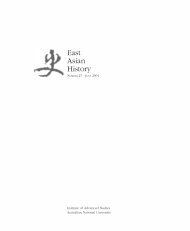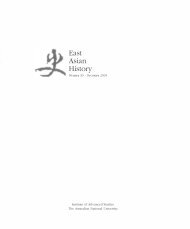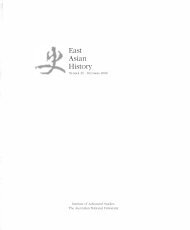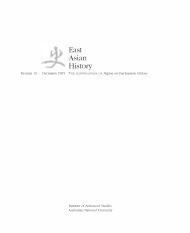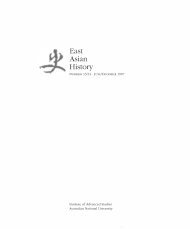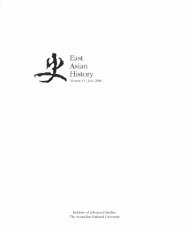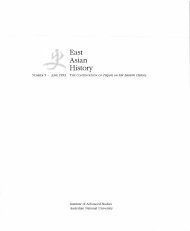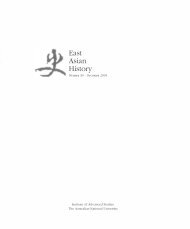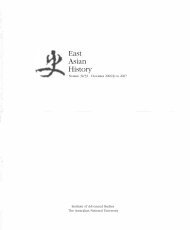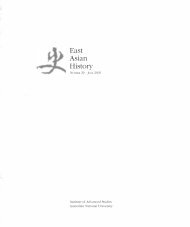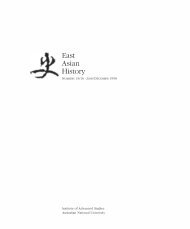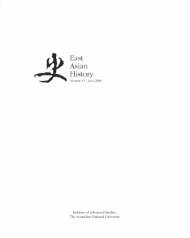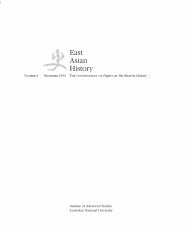East Asian History - ANU
East Asian History - ANU
East Asian History - ANU
- No tags were found...
Create successful ePaper yourself
Turn your PDF publications into a flip-book with our unique Google optimized e-Paper software.
22LEWIS MAYOIsigns of the ancestors. In perusing the riseand fall of previous ages, and in thinking onwhat people of the past took anddiscarded ... and promoting the humanenessof loving life and hating killing, We commandthat the tribute of eagles, ospreys, goshawksand merlins shall cease. On the one hand,let us halt the increase of excursions, and onthe other let us promote the sentiment ofthose that fly and run. In recent days peopleof all colours have not held to the provisionsof the decree, and have frequently offeredtribute of goshawks and falcons. This cannotbe maintained. How can the recent decreesbe shown to them? Later people will say thatwe have transgressed and violated theprohibitions. The goshawks and falconspresently in the royal mews should be takento the mountains and forests and released.Henceforth, people of all colours must notsend in offerings of this kind. If they meetthis kind of tribute, officials at the gatesshould not accept it," p.2029.63 At the same time prisoner, woman, horseand hawk only earn good treatment if theycan learn to judge the commands and wishesof their masters. The satisfactions of masteryrely on compliance, and this can never beguaranteed. The prisoner may not berecondite, the singing girl may not smile, thehorse may not gallop, and the hawk may flyslowly, or miss its target.64 Schafer continues, "Moreover, the imperialpharmacists had to take account of thetastes of these reagents, as related to theFive Organs of the body, and other complexmatters, such as the rule which determinedthat in maladies of the stomach anddiaphragm, the royal patient should eat firstand then take the medicine, while in diseasesof the heart and belly, he should take themedicine first and eat afterwards. Thecompounding took place in the watchfulpresence of the highest councillors of stateand the commander of the guard, and thefinished product was tasted by the chiefpharmacists, by the great Chamberlain (thepharmacists' superior), and by the crownprince (presumably lest he be too anxiousto succeed) before going on to thesovereign's bedside." The golden peaches ofSamarkand, p.179. Schafer's account isbased on the sections on imperial physiciansin the Da Tang Liudian :k$f;Tql*!· [SixInstitutes of the Tang]. See Song ben DaTang Liudian **:k$ft\ [The Songand horses are in this respect constituted as a force of danger: they aredispensable, and acceptable in moderation, but their attractions mayovetwhelm the emperor and imperil the realm. Prisoners, women, horses andhawks share lives of confinement and restraint: they are the products ofseizure. All are to be tamed, reduced to submission by techniques ofsubservience: in this way punishment and entertainment belong on acontinuum.63 At the same time hawks, criminals, women entertainers andhorses are united in being objects of imperial mercy. He releases them,refusing to reproduce their subordination and the techniques of restraintwhich maintain it. These lives have all given themselves over to the ruler,placed themselves in the confined world of his household-his palace or hisjails-unwillingly. Moreover, they are all received from the hands of others,sent up by delegates and subordinates. Yet each has a hold on the emperor;he is prisoner of their strange enticements. Perhaps in releasing them frombondage he expresses a wish to be liberated from the fetters of desire, fetterswhich these constrained and confined lives produce for him.The illness of the sovereign is a central issue for the political system.Medicine produces and reproduces the order of the state and the world."Each medicine should contain one 'superior' drug, monarchical andheavenly, to lengthen life, three 'middle' drugs, vassal and human, tostrengthen the organism, and nine 'inferior' drugs, ministerial and earthly, tocure the disease."64 Medicine is hierarchically structured, in a succession ofpositions and functions. The monarch, or heaven, serves to prolong life. Thesubordinate human, located in the centre, is engaged in a strengtheningaction, while the work of curing, ruling and punishing the disease (and thusof governance as a punitive cure) is the job of the delegated minister/servantlocated at the earthly level. Hawks traverse this structure-they are locateddirectly with the monarch, and with heaven, the area of flight. Yet they arealso vassals, secured from the periphery, from those who acknowledge theemperor's superiority. These vassals are local authorities, in a position ofmediation between imperial heaven and the functionaries who work on theground-where functions of security and tax collection are performedIcopy of the Six Institutes of the Great Tang],juan 10 and juan 14 (Beijing: ZhonghuaShuju, 1991), pp.221-3 and 329-31.Governmental order and cure are both thesame thing (zhi ¥i§l). But the emperor andofficialdom are not involved in a ceaseless waragainst political disease, through theestablishment of a state of somatic equipoisein the territory of the empire. Governance wasmore than triumph over irregularity anddisorder (rebellion or disease). Yet the healthof the emperor was, especially in the ninthcentury, a central target of political action, anda focus of political struggles. The imperialIquest for longevity set systems of knowledgeand ethics and the institutions which producedthem against each other. The death of the rulerwas, moreover, a structuring force in thepolitics ofthe middle and late Tang. Xuanzong,who ascended the throne at the time of theoverthrow of the Tibetans by Zhang Yichao,had the rectification of government in revengefor the murder of his father Xianzong *(who reigned from 805-20) as one of hiscentral pre-occupations. See Michael T. Dalby,"Court politics in late Tang times," in Twitchettand Wright, Cambridge history of China, vol. 3,Sui and T'ang China, pt 1, p.670.



